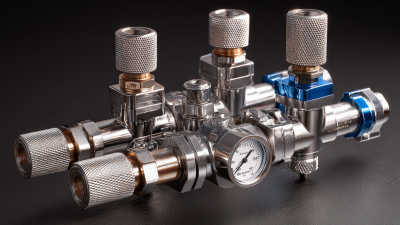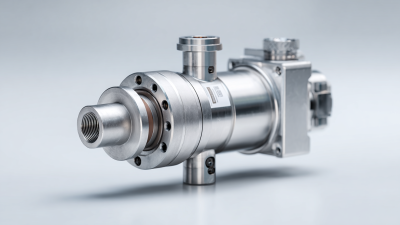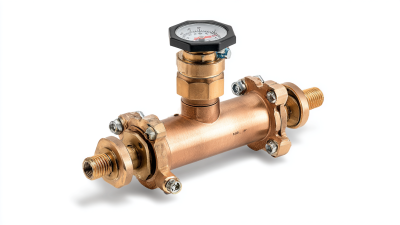- Products
- Pressure Reducing Regulators
- Back Pressure Regulators
- Tank Blanketing Valves
- Temperature Regulators
- Industrial Control Valves
- Wafer Style Control Valves
- JCVS Industrial Control Valves
- Globe Style/Cage Guided Control Valves
- Mixing/Diverting Control Valves
- Motor Operated Control Valves
- Valve Positioners & Accessories
- Applications
- Resources
- Find a Sales Rep
- Brands
Innovative Applications of Temperature Control Valves in Modern Industries
In the ever-evolving landscape of modern industries, the role of Temperature Control Valves has become increasingly critical to ensuring operational efficiency and safety. According to a report by Lucintel, the global market for temperature control systems is projected to reach $12 billion by 2026, reflecting a compound annual growth rate (CAGR) of 5.2%. This growth is driven by the rising demand for precise temperature regulation across various sectors, including pharmaceuticals, food and beverage, and chemical processing. Temperature Control Valves play a vital role in these applications by optimizing thermal processes, reducing energy consumption, and enhancing product quality. As industries continue to innovate and expand, the integration of advanced temperature control technologies is poised to deliver substantial benefits, positioning Temperature Control Valves at the forefront of industrial advancements.

Emerging Trends: The Role of Temperature Control Valves in Modern Manufacturing Processes
Temperature control valves have become increasingly crucial in modern manufacturing processes, enabling industries to enhance efficiency and product quality. These valves are essential in maintaining precise temperatures within various systems, such as chemical processing, food and beverage production, and pharmaceuticals. By regulating the flow of hot or cold fluids, temperature control valves ensure that processes remain within optimal temperature ranges, significantly reducing the risk of product spoilage or system malfunctions.
Emerging trends reveal a strong focus on the integration of smart technology within temperature control valves. Manufacturers are adopting automated systems equipped with sensors and connectivity features, allowing real-time monitoring and adjustments. This not only improves energy efficiency but also aids in predictive maintenance, minimizing downtime. Furthermore, industries are increasingly recognizing the need for sustainability, leading to the development of eco-friendly materials and designs in valve manufacturing. As companies strive to optimize their operations while adhering to environmental standards, temperature control valves are poised to play a pivotal role in the advancement of modern manufacturing processes.
Key Industries Transforming Operations with Advanced Temperature Regulation Systems
In today's fast-paced industrial landscape, advanced temperature regulation systems have emerged as a cornerstone for operational efficiency. Key industries such as pharmaceuticals, food processing, and energy are harnessing innovative applications of temperature control valves to enhance their processes. According to a recent market research report by MarketsandMarkets, the global temperature control valve market is expected to reach $3.7 billion by 2025, growing at a CAGR of 5.3%. This growth highlights the increasing demand for precision in maintaining optimal temperature levels in various manufacturing environments.
In the pharmaceutical sector, for instance, the use of temperature control valves ensures stringent adherence to safety standards during drug manufacturing and storage. A study by the American Pharmaceutical Review indicates that improper temperature management can lead to a staggering 20% increase in production costs due to spoilage and compliance failures. Similarly, the food processing industry is adopting these systems to preserve product quality and shelf life. The Food and Drug Administration (FDA) estimates that advanced temperature regulation can reduce food spoilage rates by up to 15%, significantly improving overall profitability for manufacturers.
Moreover, the energy sector is leveraging innovative temperature regulation to enhance the efficiency of power generation systems. A report from the International Energy Agency (IEA) emphasizes that effective temperature management in thermal power plants can lead to a 10% increase in productivity, directly affecting energy output and reducing operational costs. The integration of smart temperature control valves in these industries not only optimizes performance but also contributes to sustainability efforts, showcasing the transformative power of technology in modern industrial applications.
Innovative Applications of Temperature Control Valves in Modern Industries
The chart illustrates the distribution of innovative applications of temperature control valves across various key industries. The pharmaceutical industry leads with 25%, followed by food processing at 30%. Chemical manufacturing, HVAC, and oil & gas industries also utilize these advanced systems to enhance operational efficiency and safety.
The Economic Impact: Cost Savings through Improved Temperature Control in Industrial Applications
Temperature control valves play a crucial role in enhancing operational efficiency across various industries, leading to significant cost savings. According to a report by the American Society of Mechanical Engineers (ASME), effective temperature control can reduce energy consumption by up to 30%. This substantial reduction not only lowers operational costs but also contributes to a decreased carbon footprint, aligning with sustainability goals that many companies strive to achieve today.

Furthermore, a study by the International Energy Agency (IEA) suggests that industries employing advanced temperature control technologies can see return on investment (ROI) within just two years, thanks to the enhanced precision in temperature management. For example, in chemical processing, optimized thermal regulation can minimize material waste and prevent downtime due to temperature-related equipment failures. This translates into higher productivity and lower maintenance costs, showcasing the powerful economic impact of integrating innovative temperature control valves into industrial operations.
Future Innovations: How Smart Technology is Enhancing Temperature Control Valve Efficiency
As industries continue to evolve, the integration of smart technology into temperature control valves is revolutionizing efficiency and performance. These advancements not only optimize thermal regulation but also enhance the overall productivity of industrial systems. Smart temperature control valves leverage sensors, IoT connectivity, and predictive algorithms to make real-time adjustments, ensuring that processes remain within optimal temperature ranges. This leads to significant energy savings and improved equipment longevity.
**Tips:** When selecting a temperature control valve, consider options that offer intelligent features such as remote monitoring and automation. Implementing predictive maintenance can help identify potential issues before they arise, reducing unexpected downtime and maintaining consistent operations.
Additionally, investing in training for staff on the capabilities and functionalities of these smart valves can further optimize their use. Proper understanding and utilization of smart technology can significantly enhance operational efficiency and drive innovation within your facilities. Encourage interactive sessions where employees can share insights or experiences with temperature management technologies.

Case Studies: Successful Implementations of Temperature Control Solutions Across Sectors
Temperature control valves have emerged as essential components in various industries, showcasing remarkable innovation in their applications. One notable case study can be observed in the food and beverage sector, where a major brewery implemented advanced temperature control solutions to maintain the perfect fermentation conditions.
By utilizing smart valves, the brewery achieved consistent temperature regulation, resulting in a significant reduction in product variability and an increase in overall production efficiency. This implementation not only enhanced product quality but also optimized energy consumption, contributing to more sustainable operations.
In the pharmaceutical industry, a leading manufacturer adopted temperature control valves to ensure precise thermal regulation during the production of temperature-sensitive drugs.
The company integrated these valves into their existing systems, allowing for real-time monitoring and adjustments. The result was a dramatic decrease in product spoilage and compliance issues, as the temperature profiles remained within rigorous specifications throughout the production process.
This successful case underscores the critical role temperature control valves play in enhancing both product integrity and regulatory compliance, ultimately driving operational excellence across sectors.
Related Posts
-

Mastering High Pressure Regulation: A Step-by-Step Guide to Choosing the Best Regulator
-

Future Trends in Best Flow Valve Market Analysis for 2025 Industry Outlook
-

Identifying Common Issues with Gas Regulators: Ensuring Safety and Efficiency in Your System
-

Top Strategies for Maximizing Efficiency with High Pressure Regulators
-

Emerging Trends in Back Pressure Valve Technology by 2025 and Their Key Advantages for Global Buyers
-

5 Essential Tips for Choosing Your Water Pressure Regulator Valve
